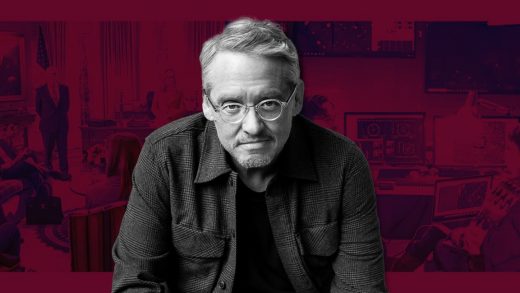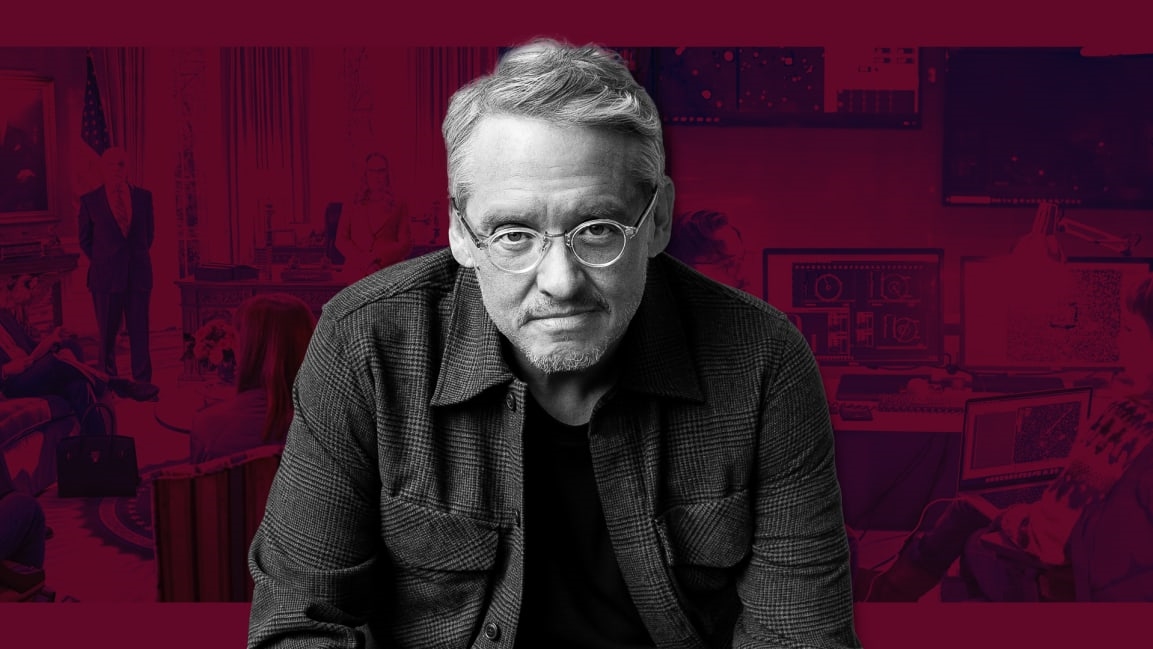Netflix’s ‘Don’t Look Up’: How Adam McKay found comedy in chaos
Listen to the latest episode of Fast Company’s Creative Conversation podcast on Apple Podcasts, Spotify, RadioPublic, Google Podcasts, or Stitcher.
One challenge of satire has always been how to spoof reality when it becomes stranger than fiction. Case in point: the election cycle of 2016 and the subsequent free fall into a sociopolitical cataclysm.
“Comedy is in a very strange place,” says writer and director Adam McKay. “I think everyone’s second and third guessing themselves. You have one group that just wants to antagonize and call it free speech. And then you have the traditional comics like myself who are from that dividing line. A lot of my friends are trying to figure it out. What can you joke about when the world is constantly falling apart in your hands, like trying to pick up a sand castle?”
It’s a quandary McKay attempted to work out in Don’t Look Up.
McKay’s latest film stars Leonardo DiCaprio and Jennifer Lawrence as a pair of astronomers who are desperately trying to alert the world that a comet is about to end life on Earth as we know it—”trying” being the operative word. What follows is a farce of government, media, and big business that doesn’t feel like much of a stretch from where we are now.
“Nick Britell, the composer for Don’t Look Up, wrote a jazz piece that I describe as like a jazz band with lead poisoning playing on the Hindenburg. That’s sort of what now feels like,” McKay says. “Everything’s broken. All the institutions are collapsing. We’re all fractured.
“So I think culture is catching up to this moment and trying to figure out what the hell’s going on—and that includes comedy.”
McKay’s early films—Anchorman: The Legend of Ron Burgundy, Talladega Nights: The Ballad of Ricky Bobby, and Step Brothers—were more straightforward comedies “making fun of bogus white-guy culture,” McKay says. “We jokingly called [them] the mediocre white guy trilogy.”
But like for so many others, there was a shift for McKay during the 2008 financial collapse.
“You started seeing the effects of that entitlement—and the effects were dark,” he says. “Now you look at the ultimate version of it: It’s people attacking the Capitol building trying to overthrow an election, extremists. And then the biggest of all the big stories, without exaggeration, empirically, the collapse of the livable atmosphere while we sit on our hands kind of getting knocked around by our distraction culture. So I think what allowed me to do comedy with [Don’t Look Up] was that I was going to do comedy about what it feels like to be alive right now.”
Check out highlights of McKay’s conversation below where he discusses a new state of satire, Don’t Look Up‘s subversive ending, and his definition of creativity.
It’s hard to explain
“Where is comedy? Where is culture? We’re sort of caught between these two eras. So I’m really inspired by recent films that have played with genre. And I do think that we’re living in a time that defies genre. So a movie like Get Out, which is so brilliant, but I don’t know what to call that. That’s a satire, horror, thriller comedy? You look at a movie like Kung Fu Hustle, which I worship: It’s like a living cartoon love story. So I’m definitely drawn to that point at which it’s hard to define. The whole time we were making this movie, we kept joking about how would you categorize it. And the closest we came up with is it’s like if It’s a Mad, Mad, Mad, Mad World was made by Lars von Trier.”
An Inconvenient ending
“It was such a freeing feeling knowing that I didn’t have to do the usual three-chord progression ending that you always do. And this is not giving anything away: It’s not a traditional ending. The fact that I knew that I didn’t have to click into that Michael Bay, Marvel movie—or, for older people, Towering Inferno—ending was so freeing. Some of my favorite scenes in the movie are during that stretch [toward the end], because we sort of throw off this Syd Field—the famous screenwriting instructor and author—we throw off the Syd Field exoskeleton, and the movie gets to just operate with this level of freedom that was just an absolute joy to write and to film.”
Follow the trail no matter how far it goes
“I would say creativity, if we’re going to put it in the rawest, simplest terms for me, is always some sort of hitch or toehold of inspiration. It could be really small. And it can sometimes happen in an instant. Sometimes it builds over months. But there’s a moment where you realize that you have a seed, that you have something that’s so rich and full of possibilities that [you] feel like [you] could write 500 pages on it. And that’s always when I know I’ve got something that’s exciting, when it feels endless.”
Fast Company , Read Full Story
(39)



